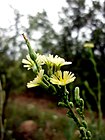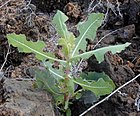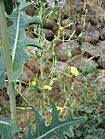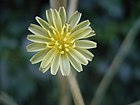Note: This is a project under development. The articles on this wiki are just being initiated and broadly incomplete. You can Help creating new pages.
Difference between revisions of "Lactuca serriola - Kahu"
(→Uses) |
|||
| Line 4: | Line 4: | ||
==Uses== | ==Uses== | ||
| − | {{Uses|Cardiac paralysis}}, {{Uses|Chronic catarrh}}, {{Uses|Coughs}}, {{Uses|Swollen liver}}, {{Uses|Flatulence}}, {{Uses|Urinary tract}}, {{Uses|Ailments}}. | + | {{Uses|Cardiac paralysis}}, {{Uses|Chronic catarrh}}, {{Uses|Coughs}}, {{Uses|Swollen liver}}, {{Uses|Flatulence}}, {{Uses|Urinary tract infection}}, {{Uses|Ailments}}. |
==Parts Used== | ==Parts Used== | ||
Revision as of 12:19, 12 April 2019
Lactuca serriola is an annual or biennial plant in the dandelion tribe within the daisy family. It has a slightly fetid odor and is commonly considered a weed of orchards, roadsides and field crops. Lactuca serriola is known as the compass plant because in the Sun the upper leaves twist round to hold their margins upright.Western ghats
Contents
- 1 Uses
- 2 Parts Used
- 3 Chemical Composition
- 4 Common names
- 5 Properties
- 6 Habit
- 7 Identification
- 8 List of Ayurvedic medicine in which the herb is used
- 9 Where to get the saplings
- 10 Mode of Propagation
- 11 How to plant/cultivate
- 12 Commonly seen growing in areas
- 13 Photo Gallery
- 14 References
- 15 External Links
Uses
Cardiac paralysis, Chronic catarrh, Coughs, Swollen liver, Flatulence, Urinary tract infection, Ailments.
Parts Used
Chemical Composition
Acetylcholine chloride, atropine sulfate, carbachol, dicyclomine, dimethylsulfoxide, ethylenediamine tetraacetic acid, glucose[1]
Common names
| Language | Common name |
|---|---|
| Kannada | |
| Hindi | |
| Malayalam | |
| Tamil | |
| Telugu | |
| Marathi | NA |
| Gujarathi | NA |
| Punjabi | NA |
| Kashmiri | NA |
| Sanskrit | |
| English | Wild Lettuce, Lettuce Opium |
Properties
Reference: Dravya - Substance, Rasa - Taste, Guna - Qualities, Veerya - Potency, Vipaka - Post-digesion effect, Karma - Pharmacological activity, Prabhava - Therepeutics.
Dravya
Rasa
Guna
Veerya
Vipaka
Karma
Prabhava
Habit
Identification
Leaf
| Kind | Shape | Feature |
|---|---|---|
| Simple | lobed or unlobed but not separated into leaflets and Leaf arrangement is alternate |
Flower
| Type | Size | Color and composition | Stamen | More information |
|---|---|---|---|---|
| Unisexual | 2-4cm long | blue to purple, and yellow | 5-20 | the flower head has ray flowers only, meaning all of the individual flowers of the flower head have a strap-shaped ray |
Fruit
| Type | Size | Mass | Appearance | Seeds | More information |
|---|---|---|---|---|---|
| Simple | 7–10 | at least a part of the plume is made up of fine bristles | Tuft or plume on fruit | many | {{{6}}} |
Other features
List of Ayurvedic medicine in which the herb is used
- Vishatinduka Taila as root juice extract
Where to get the saplings
Mode of Propagation
How to plant/cultivate
Prefers a light sandy loam in a sunny position[3]
Commonly seen growing in areas
Photo Gallery
References
External Links
- Ayurvedic Herbs known to be helpful to treat Cardiac paralysis
- Ayurvedic Herbs known to be helpful to treat Chronic catarrh
- Ayurvedic Herbs known to be helpful to treat Coughs
- Ayurvedic Herbs known to be helpful to treat Swollen liver
- Ayurvedic Herbs known to be helpful to treat Flatulence
- Ayurvedic Herbs known to be helpful to treat Urinary tract infection
- Ayurvedic Herbs known to be helpful to treat Ailments
- Herbs with Leaves used in medicine
- Herbs with common name in English
- Habit - Herb
- Index of Plants which can be propagated by Seeds
- Herbs that are commonly seen in the region of Roadsides
- Herbs that are commonly seen in the region of Waste places
- Herbs










